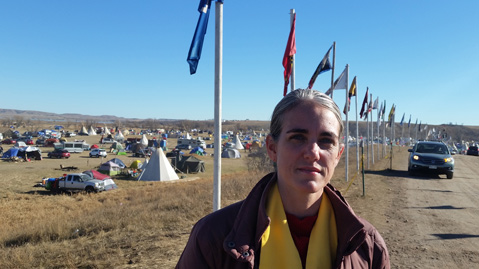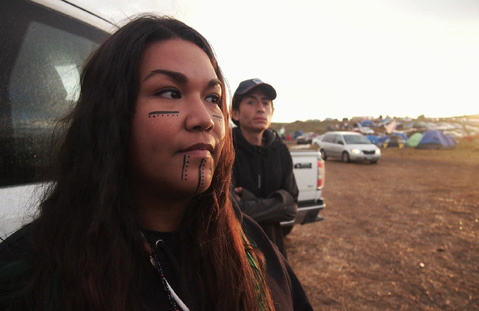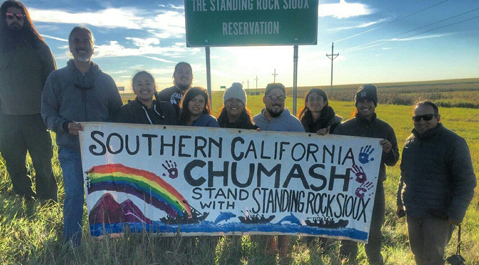S.B. Clergy, Chumash Carry Standing Rock Fire
Bring Back Stories of Police Force and Tribal Sovereignty

It was hard for Reverend Julia Hamilton to remain calm. The lead minister of the Unitarian Society of Santa Barbara traveled to North Dakota last week to witness the months-long standoff between state police and Native American tribes protesting the construction of an oil pipeline near the Standing Rock Sioux reservation. Tribal elders had warned Hamilton, along with 500 other participating religious leaders from all over the world, they would see things that would upset them. But it was important, the elders said, to retain their compassion for everyone involved — even the men in riot gear.
Soon after, Hamilton watched a small band of shirtless demonstrators — who call themselves the “water protectors,” as they fear the 1,100-mile pipeline carrying Bakken crude will pollute the Missouri River and its tributaries — wade across a stream to reach a sacred burial site on the opposite shore occupied by construction crews. The police were swift and brutal. “I was struck by the disproportionate response,” Hamilton said. “It’s one thing to arrest someone. It’s another thing to tear gas them, shoot them with rubber bullets, and throw them in the back of a van.”
In her four days at Standing Rock, sleeping in a tent among more than 200 native tribes in their main Oceti Sakowin camp, Hamilton saw more ugliness. But she saw beauty and determination, too. “I was struck by the seriousness of purpose mixed with a deep sense of gratitude for the Earth,” she said. “And the whole place was infused with prayer.” The camp awoke at 6:30 every morning to a morning prayer following by water blessings and ceremonial singing. The clergy gathered in a circle one day to repudiate and burn copies of the Doctrine of Discovery — the papal bull that mandates the forcible conversion of native people. All the while, a police surveillance plane buzzed overhead.

Mostly, Hamilton listened. She heard the Sioux and their supporters talk about their survival and the protection of their sacred lands. She heard them appealing to the humanity of the police and the pipeline operators, to recognize the risk all North Dakotans would face if oil seeped into the Missouri. And they decried the continued dumping of environmentally risky projects on native people; the path of the $3.8 billion pipeline was previously moved away from neighboring Bismarck because it was deemed too much of a threat to the city’s drinking water.
“Asking the Standing Rock Sioux Tribe to accept the pipeline would be like asking us here in Santa Barbara to accept a pipeline built under Lake Cachuma that also needed to run through part of the Santa Barbara Cemetery,” said Hamilton. “Why should we expect other people to allow in their community what we would be unwilling to allow in ours?”

In September, Carpinteria resident Solange Aguilar and a delegation of a dozen Chumash people delivered four truckloads of supplies to the camps. As a frigid Midwest winter sets in, neither side is showing signs of backing down, so the protesters are outfitting teepees and tents with heating and insulation and stocking up on food and clothing. Aguilar and her group felt great apprehension on their way to North Dakota as the few media reports they’d watched had focused on conflict and violence. “But when we got there, the sun was setting, and it was one of the most beautiful places I’d ever seen,” she said.
“All these nations — thousands of people,” Aguilar went on, “everyone was so welcoming, so warm and kind.” As is customary, Aguilar and the other Chumash announced their arrival and their purpose, and then distributed supplies before praying at the water’s edge. On the frontlines facing the police, Aguilar met a descendent of Sitting Bull. He told her to take the Standing Rock fire back to her people. Keep telling their story, he said, and don’t let it fade. “We’ve been doing that ever since,” said Aguilar. “Winter is coming. They need to be remembered.”



